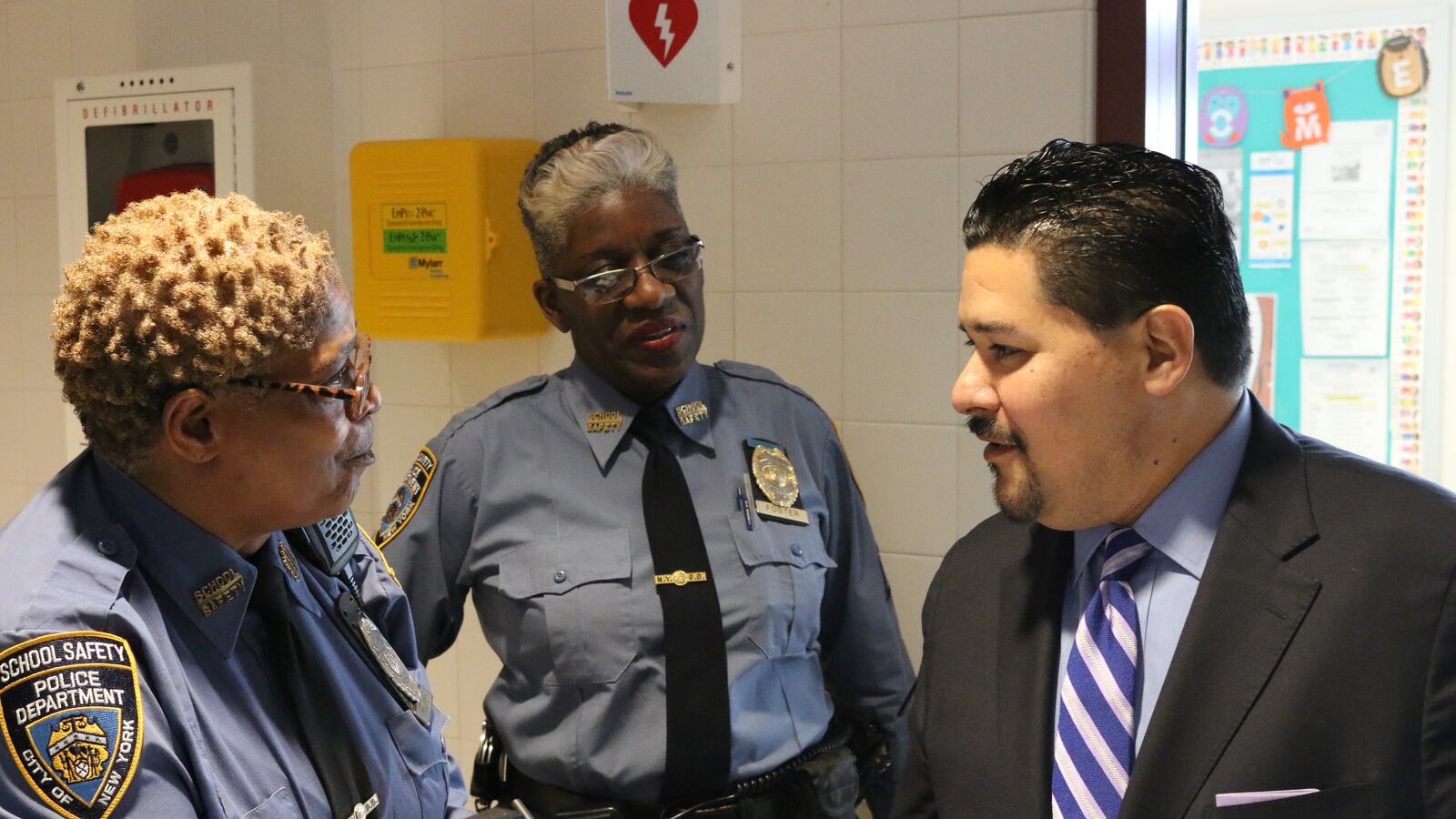Chancellor Richard Carranza is poised to unveil the results of his overhaul of school discipline policies — and the changes could be significant.
Carranza said recently he is “very close” to announcing his recommended changes to the code, which governs acceptable behavior and punishments for students across the city. The chancellor — who has has been much more forceful in calling out racial disparities in student punishments than his predecessor — has said there will be “no sacred cows” as he rethinks the manual.
After two rounds of changes to school discipline policies since Mayor Bill de Blasio took office in 2014, suspensions have fallen by 32 percent, though big disparities have persisted.
The chancellor has signaled that reducing suspensions and racial disparities will be at the center of the education department’s revisions.
“We’ve driven down suspensions and suspension lengths while crime has also fallen, but there’s a lot more work to do to advance equity now,” education department spokesperson Miranda Barbot wrote in a statement.
But what, exactly, is under consideration and how would any edits to the discipline code affect students and educators? The education department declined to say what is under consideration, but here are four questions we’re asking.
Will the city cut down on lengthy suspensions?
Suspensions have generally fallen, but lengthier out-of-school suspensions have remained relatively steady under de Blasio. Discipline reform advocates are hoping the city will aggressively cut down on these so-called “superintendent” suspensions, which were handed out more than 10,000 times last school year and which can last from six days up to an entire school year.
These suspensions often result in students being removed from their school and sent to a suspension center, often disrupting their studies and landing them in an environment that some have described as feeling like jail. Almost 90% of out-of-school suspensions were issued to black or Hispanic students last school year, a group that comprises 67% of the city’s students
City officials have strongly hinted that changes could be coming. A spokesperson previously said the mayor is “concerned with the length of our suspensions.” And the education department has quietly started sending students back to class faster after they are suspended.
“I would expect suspension caps in terms of length,” said Dawn Yuster, the school justice project director at Advocates for Children. A bill making its way through the state legislature would cap suspensions at 20 days and eliminate suspensions for students in grades K-3, but it is not clear whether it will pass before the session ends in June or whether the city will consider those changes on its own.
Racial disparities have persisted despite fewer suspensions. Can the city tackle that?
Disparities in who gets suspended have remained stubborn despite two waves of discipline reforms under de Blasio. Black students receive about 46% of the city’s suspensions, despite being 26% of the student body, according to the most recent suspension data. Black students are also more likely to receive harsher punishments for the same offenses as students from other racial backgrounds, an Independent Budget Office report found.
One approach to reduce those disparities, advocates say, would be to limit the discretion educators have in punishing students and eliminating minor and more subjective infractions such as “insubordination.” (The education department now requires extra approval to suspend a student for insubordination, though other large districts have scrapped similar violations entirely.)
Cara Chambers, the director of the Legal Aid Society’s education advocacy project, pointed to infraction B24, which covers everything from spitting to throwing chalk. Students who are cited for B24 can receive punishments ranging from a meeting with school officials to an out-of-school suspension for two weeks. “There’s a lot of discretion there that leaves room for bias or racial discrimination to sneak in,” she said.
How will educators respond?
Some educators and union officials have pushed back against efforts to curtail suspensions, arguing the efforts have created less orderly classrooms.
Chanan Kessler, who has recently taught at two Bronx high schools, said he’s not in favor of another round of discipline reforms and worries about what the effects might be. After multiple overhauls of the discipline code, he said, educators felt pressure not to suspend students for fear of attracting scrutiny from supervisors or education department officials.
As a result, “students felt like they could be roaming the halls, cutting class, engaging in other behaviors that sort of lends to [a] chaotic atmosphere,” Kessler said. He said he has not received explicit training on restorative justice, an approach favored by the city that relies on mediation, discussions to ferret out the root causes of conflict, and other interventions in lieu of suspensions.
“I think schools have to have some tools,” he said, referring to suspensions. Any changes to the discipline code will require the city to hold public hearings before they’re adopted.
Will the city boost training for alternatives to suspensions?
One thing supporters and critics of discipline reform agree on: The education department has not paired its mandate to reduce suspensions with enough training to effectively transition to more restorative approaches.
An education department spokesperson wrote in an email that the city spends $47 million each year on a series of initiatives, including mental health restorative justice, and an additional $23 million on anti-bias training. Officials could not say how many schools or educators citywide had received restorative justice training.
Nelson Mar, an attorney at Bronx Legal Services who supports discipline reforms, stressed that additional trainings are essential. Without helping educators across the city adapt to restorative approaches, “it’s likely you’re going to experience significant pushback, you won’t get that buy in,” he said, “and you’ll see these efforts significantly frustrated.”

